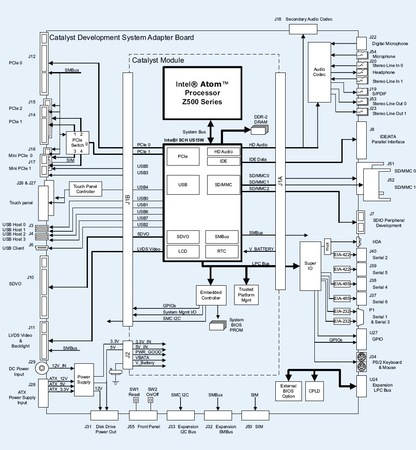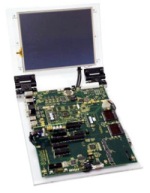Atom-based CPU module runs Linux
Apr 25, 2008 — by LinuxDevices Staff — from the LinuxDevices Archive — 66 views Eurotech (formerly ADS) has introduced an Intel Atom-based development system built around a 3.9 x 2.8 inch computer-on-module (COM). The Catalyst targets ruggedized handheld, medical, and industrial designs, has a wide variety of interfaces, and runs Linux, the company says.
Eurotech (formerly ADS) has introduced an Intel Atom-based development system built around a 3.9 x 2.8 inch computer-on-module (COM). The Catalyst targets ruggedized handheld, medical, and industrial designs, has a wide variety of interfaces, and runs Linux, the company says.
(Click here for a larger view of the ADS Catalyst module)
Like other development systems of its type, the Catalyst is designed so manufacturers can begin their hardware development by plugging the COM into a generic carrier board. The carrier board supplies as many standard PC-style interfaces as possible. At a later stage, as Eurotech notes, a simplified, task-specific carrier board can be designed, lowering cost.
Like other COMs from Eurotech subsidiary ADS, the Catalyst uses a proprietary form factor, in this case measuring 3.9 x 2.8 inches. It uses Intel's Z500 series Atom processor, which is available at clockspeeds from 800MHz to 1.6GHz. It also uses Intel's SCH companion chip, the only chipset available for Atom. (For more details, see our earlier coverage, here.) It can be configured with 512 or 1GB of DDR2 SDRAM.

A block diagram of the Catalyst module and development system
(Click to enlarge)
The module's I/O interfaces, as shown on the block diagram above, clockwise from the top), include:
- HD audio
- IDE
- SD
- SMBus
- LPC (low pin count) bus
- LVDS video
- SDVO (serial digital video out)
- 8 x USB 2.0
As the block diagram further shows, the carrier board extends these interfaces, providing as wide a range of capabilities as possible. For example, HD audio is relayed to a six-channel audio codec on the board, which delivers two 3.5mm stereo line inputs, two stereo line inputs, analog and digital microphone inputs, and an S/PDIF digital audio output. Similarly, the LPC bus is used to provide six serial ports, plus PS/2 keyboard and mouse connectors.
 The carrier board (right) folds, laptop-style, for portability, and features a 10.4-inch touchscreen display with 800 x 600 resolution. Also on the board is an 80GB hard drive, while expansion possibilities include three standard one-lane PCI Express slots, plus two Mini PCI slots.
The carrier board (right) folds, laptop-style, for portability, and features a 10.4-inch touchscreen display with 800 x 600 resolution. Also on the board is an 80GB hard drive, while expansion possibilities include three standard one-lane PCI Express slots, plus two Mini PCI slots.
The board can accept power from an ATX-style power supply, but also has a separate 12VDC power input, plus 5VDC and 12VDC power outputs for peripherals. ADS says the Catalyst module's power consumption averages between two and three Watts, and is never higher than five Watts. However, power consumption for the overall system including carrier board was not specified.
Features and specifications released by ADS for the Catalyst development system include:
- Processor — Intel Atom, available in clock speeds from 800MHz to 1.6GHz
- Memory — 512MB or 1GB of RAM
- Storage — 80GB HDD
- Display — 10.4 inch touchscreen display with 800 x 600 resolution
- Networking — can be added via Mini PCI slots
- Other I/O:
- 7 x USB 2.0
- 6 x serial (2 x RS232, 2 x RS422, 2 x RS485)
- 1 x IDE/PATA
- I2C bus
- IrDA interface
- SDIO development interface
- LPC bus
- 2 x stereo line inputs
- 2 x stereo line outputs
- Analog and digital microphone inputs
- S/PDIF output
- 7 x USB 2.0
- Expansion:
- 3 x 1-lane PCI Express slots
- 2 x Mini PCI slots
- 2 x SD slots
- 3 x 1-lane PCI Express slots
- Dimensions:
- Module — 3.9 x 2.6 inches
- Carrier board — 11.6 x 9.6 inches
- Overall system (carrier board, folding display) — 18 x 11 inches
- Module — 3.9 x 2.6 inches
- Operating temperature (module) — -40 to 85 deg. C
Further Information
The Catalyst development system runs Linux, Windows CE, Windows XP Embedded, Windows XP, and Windows Vista, according to ADS, along with a variety of real-time operating systems. ADS did not provide pricing or availability information for the Catalyst system, which was demonstrated at the Embedded Systems Conference (ESC) in San Jose earlier this month.
This article was originally published on LinuxDevices.com and has been donated to the open source community by QuinStreet Inc. Please visit LinuxToday.com for up-to-date news and articles about Linux and open source.